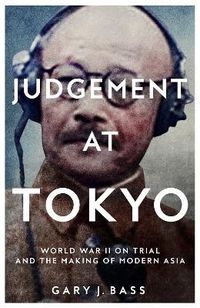
endast ny
Judgement at Tokyo
A landmark, magisterial history of the trial of Japan's leaders as war criminals-the largely overlooked Asian counterpart to Nuremberg.
In the weeks after Japan finally surrendered to the Allies, the world turned to the question of how to move on from years of carnage and destruction. For Harry Truman, Douglas MacArthur, and their fellow victors, the questions of justice seemed clear: Japan's leaders needed to be tried and punished for the surprise attack at Pearl Harbor; shocking atrocities against citizens in China, the Philippines, Korea, and elsewhere; and rampant abuses of POWs. For the Allied Forces, the trial was an opportunity to achieve justice against the defendants, but also to create a legal framework for the prosecution of war crimes and to prohibit the use of aggressive war, and to create the kind of liberal international order that would prevail in Europe. For the Japanese leaders facing trial, it was their chance to argue that their war had been waged to liberate Asia from Western imperialism.
For more than two years, lawyers for both sides presented their cases before a panel of judges from China, India, the Philippines, and Australia, as well as the US and Europe. The testimony ran from horrific accounts of brutality and the secret plans to attack Pearl Harbor to the Japanese military's threats to destabilize the government if it sued for peace. Yet rather than clarity and unanimity, the trial brought division and complexity; these tensions and contradictions could also be seen playing out across Asia as the trial unfolded, from China's descent into civil war to India's independence and partition to Japan's first successful democratic elections and the rewriting of a new, liberal constitution.
Judgement at Tokyo is a riveting story of wartime action, dramatic courtroom battles, and the epic formative years that set the stage for the Asian postwar era.
Utgiven: 2023
ISBN: 9781509812752
Förlag: Pan Books Ltd
Format: Häftad
Språk: Engelska
Sidor: 800 st
A landmark, magisterial history of the trial of Japan's leaders as war criminals-the largely overlooked Asian counterpart to Nuremberg.
In the weeks after Japan finally surrendered to the Allies, the world turned to the question of how to move on from years of carnage and destruction. For Harry Truman, Douglas MacArthur, and their fellow victors, the questions of justice seemed clear: Japan's leaders needed to be tried and punished for the surprise attack at Pearl Harbor; shocking atrocities against citizens in China, the Philippines, Korea, and elsewhere; and rampant abuses of POWs. For the Allied Forces, the trial was an opportunity to achieve justice against the defendants, but also to create a legal framework for the prosecution of war crimes and to prohibit the use of aggressive war, and to create the kind of liberal international order that would prevail in Europe. For the Japanese leaders facing trial, it was their chance to argue that their war had been waged to liberate Asia from Western imperialism.
For more than two years, lawyers for both sides presented their cases before a panel of judges from China, India, the Philippines, and Australia, as well as the US and Europe. The testimony ran from horrific accounts of brutality and the secret plans to attack Pearl Harbor to the Japanese military's threats to destabilize the government if it sued for peace. Yet rather than clarity and unanimity, the trial brought division and complexity; these tensions and contradictions could also be seen playing out across Asia as the trial unfolded, from China's descent into civil war to India's independence and partition to Japan's first successful democratic elections and the rewriting of a new, liberal constitution.
Judgement at Tokyo is a riveting story of wartime action, dramatic courtroom battles, and the epic formative years that set the stage for the Asian postwar era.
Ny bok
226 kr237 kr
5% studentrabatt med Studentapan
Begagnad bok (0 st)
Varje vecka tillkommer tusentals nya säljare. Bevaka boken så får du meddelande när den finns tillgänglig igen.



